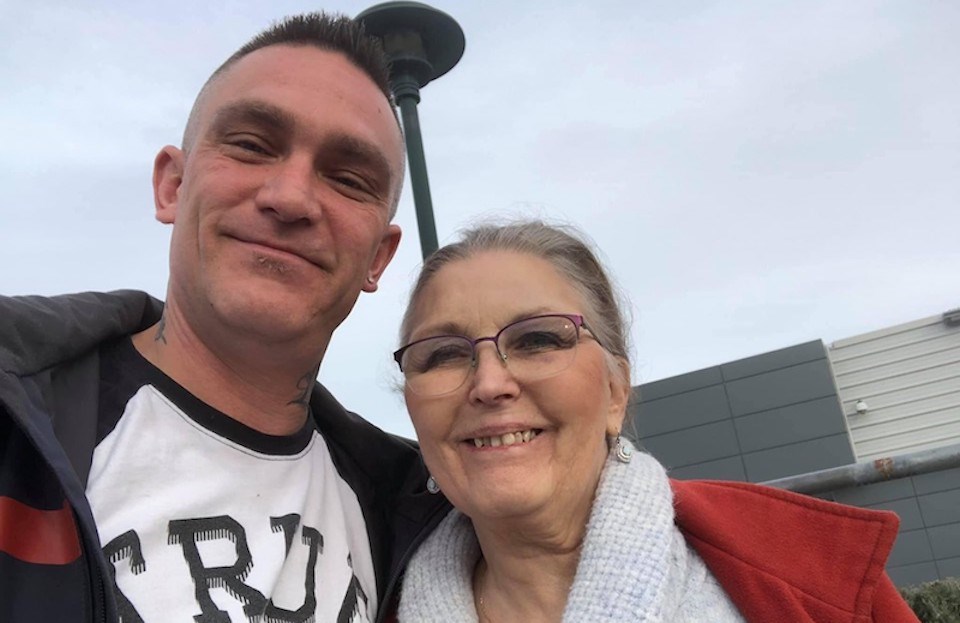"He wasn't just 'the Drugs Store' guy. He was my son."
Melodey Rennie says her late son, advocate Jerry Martin, was also a brother, father, uncle, and "a kind, compassionate person."
after he was taken off life support. A few days before that, he reportedly overdosed on fentanyl. He was 52.
"I'm going to miss him so much," Rennie told V.I.A.
Rennie was told her son had been "found unresponsive with a heart attack." She immediately drove to Vancouver from Red Deer, Alta., and realized it was much more serious when she got to the intensive care unit.
Just after 12:45 p.m. on Friday, Rennie asked for her son's ventilator to be removed.
"I sat with him and held him until his heart stopped beating and his breathing stopped. He passed at 1:25 p.m.," she said.
"My heart is broken."
In early May, Martin opened The Drugs Store, a mobile store that sold illicit substances to people who use drugs. Street drugs like methamphetamine, heroin, MDMA and cocaine were tested to ensure they were free from harmful cuts, such as fentanyl, as well as buffs and adulterants.
He was arrested by Vancouver police the day after the store opened, preventing him from continuing to sell drugs from his camper.
The late advocate told V.I.A. that he had been prepared to go to jail for years if it helped save lives. He said he found his brother under a bridge following an overdose but knew countless other people who died from a toxic drug supply or from trying to access drugs.
Martin spent about eight years on the street on the Downtown Eastside and had been sober for the better part of 15 years. But his mother believes that the difficulties he encountered opening the mobile drug shop may have made him begin to lose hope.
"I am sure he struggled harder than I realized," she said, noting that he faced many challenges over his life.
"Jerry was the kind of guy you couldn't help but like.'"
Martin, who was born in Vancouver on Oct. 3, 1971, grew up mainly in Ontario but the family "moved quite a bit as his father did not hold a permanent job or career."
Rennie notes that he also suffered several head injuries between ages seven and 11 and that his "personality changed and he became difficult to deal with." After that, he went to live with his father after the couple split up. His younger brother DJ was murdered in 2000.
After he began using drugs, Martin spent time in prison. He was homeless in several cities, including Calgary, but took a computer science course while he was in rehab. He studied on a laptop that his mom bought for him.
"He taught himself how to code, build websites, and began to research his cause for medical marijuana," she explained, adding that she was impressed by his creativity, resourcefulness and determination.
Although they didn't always see eye-to-eye, particularly about his advocacy for safe supply, Rennie said her son always kept in contact. When she saw him, she would take him out for a meal and he would always ask for two. He would give the second one to the first homeless person he saw when they left.
"If someone needed food, clothes, money and he had it, he would give it to them," she said. "He had a heart for people, especially children and animals. I am going to miss him so much.
"One of our pastors who befriended Jerry when he was in Calgary said in his remarks: 'Jerry was the kind of guy you couldn't help but like.'"
Toxic drug supply claims over 1,000 lives in 小蓝视频 in five months
In 2022, the 小蓝视频 Coroners Service reported 2,272 suspected illicit drug toxicity deaths. Over 1,000 lives have been lost to toxic unregulated drugs in the first five months of 2023.
Prominent Vancouver safe supply activist Dana Larsen wrote in a that Martin was a "brave and compassionate man who changed thousands of people's lives for the better" while struggling with depression and addiction.
"It seemed to me that the way he fought those dark feelings and found meaning in his life was through devotion to helping others and challenging injustice," he said.
Martin ran a cannabis compassion club in Saskatchewan, where he was called "The King of Compassion" and known for "carrying stacks of five- and ten-dollar bills so he could give them out to any people in need," he wrote.
When Martin came to Vancouver, he invested "everything he had financially, emotionally, and spiritually into creating his safer drug supply project." And while he was prepared to get arrested, "he didn't expect to have his trailer, vehicle and all his assets seized on his first day."
Larsen underscored that the "prevalence of deadly poisons in our drug supply makes it all too easy for a moment of weakness and depression to become a permanent loss."
Martin's lawyer Paul Lewin echoed Larsen's sentiments, noting that the late advocate was fighting to make "drug laws more humane" and wanted to help the most vulnerable.
"This is something he has sought to do all his life. He was a compassionate man who gave a lot to those in need," he told V.I.A.
"He will be missed."



